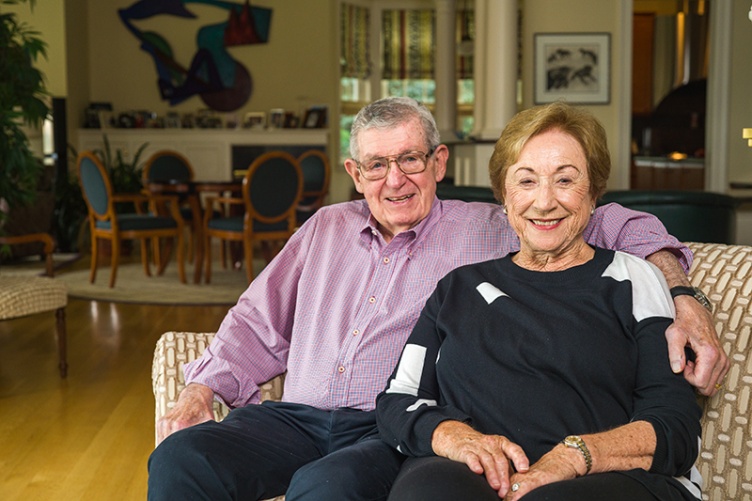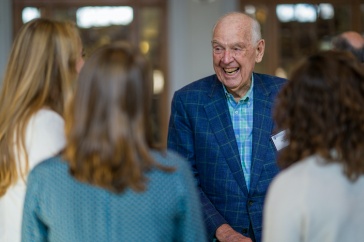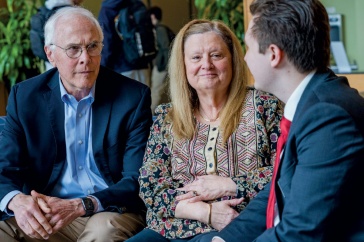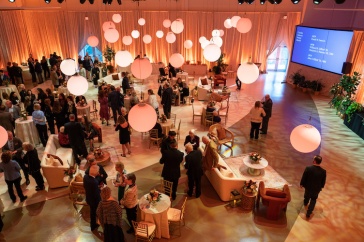
Paul '71H and Anna Grace '76 Holloway recently made an investment to endow the Holloway Prize Competition, which they founded in 1988.
When it first began in 1988, the Paul J. Holloway Prize Competition, aimed at encouraging entrepreneurial passion and innovative ideas for businesses, had what would be considered standard business ideas: a plan to launch a babysitting service, an idea for a dog-walking business, and the like.
More than 30 years later, the competition ideas have become much more advanced to address today’s challenges, with student teams competitively clamoring for a chance to bring their big idea to market. The annual event recognizes students who conceptualize, develop and pitch the most compelling proposals to bring a product to market and awards students thousands of dollars in cash and prizes every year.

This story was part of the fall edition of IMPACT, the donor publication of good news and inspiration made possible by UNH supporters. Read more stories like this in the latest edition: impact.unh.edu
Now, thanks to a recent gift from the competition’s original founders and funders, Anna Grace and Paul Holloway, that tradition of innovation will live on indefinitely. Earlier this year, the Holloways invested $1.6 million through planned giving to endow their namesake competition.
They see it as a continuation of their legacy at UNH. Paul served for many years as a trustee on the University system board, Anna Grace earned her undergraduate degree from UNH, their son got his master’s here, their daughter earned both an undergraduate and a graduate degree here, and now they have a grandson enrolled as well.
When the competition was founded, says Anna Grace, the aim was for her, son Scott and daughter Debra to honor Paul’s achievements and contributions to the educational and business communities of New Hampshire by creating a connection between UNH’s research focus and the corporate world.
Steadily the competition grew, expanding beyond the business school to be a university-wide, and then a university system-wide, offering — and along the way, fostering a sense of entrepreneurship among students, but also inspiring faculty to mentor students so that their ideas would become practical business plans that could really take off.
Many present-day businesses began as Holloway Competition entries, including the Tuscan Kitchen chain of restaurants and NOBL coffee. This year’s first place winner, Kikori, is a software platform that allows K-12 educators to incorporate more learning-by-doing activities into their classroom experiences — especially helpful in this new normal of remote learning.
Anna Grace believes that once the competition opened up to students from other schools and colleges across campus, it created a bumper crop of big ideas, as engineering students had the science background for solutions, and business school students had the knowledge of marketing and pitching those products.
Both Anna Grace and Paul consider themselves entrepreneurs through a variety of businesses they’ve launched or invested in. Paul Holloway had a successful career with Buick Motor Division before buying a Buick-Pontiac dealership in Exeter and transforming it into the auto sales and service empire Dreher-Holloway. Anna Grace has started several businesses on her own, and comes from a family of entrepreneurs, notably two uncles who created a successful crane business from a buggy business and who today would be considered industrialist-philanthropists for their success and their charitable giving.
Paul points to his own story, and those who helped him along the way, as his inspiration for giving to worthy causes. He grew up in an 18-foot-wide rowhouse in Philadelphia, his family unable to afford a car until he was a teenager. He found his athletic talents helped him make his way — as did people who lent a helping hand.
“If it wasn’t for some people along the way, helping me in sports, I would never even have gotten to college,” he says. Now many years of success later, he adds, “I just think when you’re successful you have an obligation to help make other people successful.”
Anna Grace agrees.
“There are influences along the way; I think your life is defined by the influences that you have,” she says. One of the greatest influencers can be your education — a cause the Holloway family is happy to support. “I’m a true believer that education makes the person, and education is a lifelong thing. You don’t stop after four years, so what better to support than education? Especially something like this that is an extra opportunity.” Both are pleased with Dean Deborah Merrill Sands’ emphasis on out-of-the-classroom learning experiences, and count the Holloway competition as one example of the benefits of that type of learning.
The Holloways believe that by ensuring the competition lives on after them, they are modeling behavior for their children and grandchildren to give back in the future.
“It’s not about what you have in your bank account or your pocket, it’s about the difference you make,” says Anna Grace.



















































